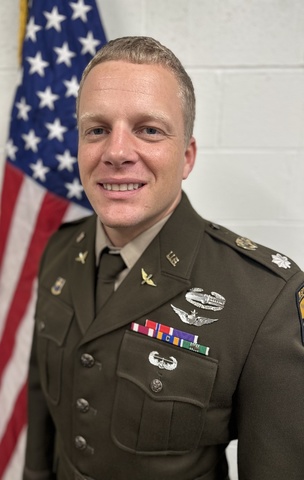The Department of Health, Sport, and Human Physiology, within the College of Liberal Arts and Sciences, is partnering with the University of Iowa Army Reserve Officer Training Corps (ROTC) to conduct body composition tests for all cadets.
The collaboration benefits everyone involved, said Lieutenant Colonel Todd Kuebler, professor of military science. HSHP students engage in experiential learning by administering and interpreting body composition tests. Army ROTC cadets also learn more about their bodies and how to optimize their health.

“The University of Iowa has so many resources and experts in their fields,” Kuebler said. “Anytime departments can work together our students win. The students administering the tests can educate a future generation of leaders who are required to meet physical standards.”
Kuebler said physical fitness is a big component of the Army ROTC and the military. As an active-duty army officer, Kuebler is required to take a physical fitness test twice a year. Cadets entering the military will have to do the same.
With the obesity epidemic, there is concern that a growing number of soldiers aren’t fit to serve, said Lucas Carr, an associate professor in the Department of Health and Human Physiology. Just over one in three young adults are too overweight to serve in the military, according to the Centers for Disease Control and Prevention.
Carr is also the director of the Community Health Collaborative, which provides evidence-based, preventative health services to all community members while also training future health leaders. The collaborative provides health coaching, health testing, and various resources.
One of the health testing services offered is body composition tests using state-of-the-art BOD POD air displacement technology. When Kuebler saw the collaborative had a BOD POD machine, he immediately sought funding from the Army.
“Accurate tests of body composition are used to determine a portion of each soldier’s fitness level,” Carr said. “The Community Health Collaborative is one of the only places in Eastern Iowa to offer the type of body composition tests the Army uses for their body composition program.”

Carr looked at the Army requirements and tailored the education to fit ROTC students, Kuebler said.
“Hopefully, freshmen and sophomores will be able to go back to the BOD POD next year and see how their body is changing, either through lifestyle or physical development,” Kuebler said. “They’ll be able to understand how they can optimize themselves and live a healthier lifestyle.”
This is the first time the Community Health Collaborative will be working with the Army ROTC and Carr is excited about the potential.
“This collaboration will help support our mission of serving the community while also providing experiential learning opportunities for HHP students,” Carr said. “We train students how to administer and interpret body composition tests which allows them to apply their knowledge in a new way.”
For more information about the body composition testing program, visit the Community Health Collaborative’s website.